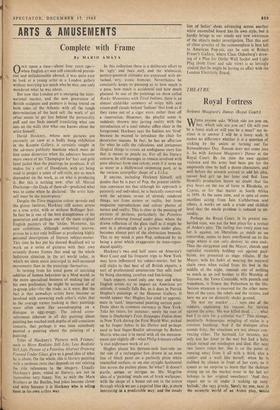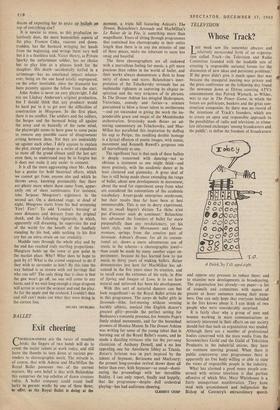THEATRE
Royal Fortress
Serjeant Musgrave's Dance. (Royal Court.)
WHEN anyone asks 'Which side are you on, hey, which side are you on? Oh will you be a lousy scab or will you be a man?' my in- stinct is to answer I will be a lousy scab. It makes no difference whether it is a question of sticking by the union or turning out for Remembrance Day. Reason does not come into it. So with Serjeant Musgrave's Dance at the Royal Court. By the time the case against violence and the army had been put for the umpteenth time by half a dozen characters, and well before the seventh arrived to add his plea, reason had girt up her loins and fled. Jane Howell's production leaves no doubt that the play bears on the use of force in Rhodesia, or Cyprus, or for that matter in South Africa in 1899. At the same time, and in spite of some excellent acting from Iain Cuthbertson and others, it works on such a crude and childish level that the whole problem is reduced to ab- surdity.
Perhaps the Royal Court, in its present em- battled state, was not the best place for a revival of Arden's play. The feeling that every man not for is against, on liberalism as much as on censorship, seems to have overflowed on to the stage where it can only destroy its own ends. Thus the clergyman and the Mayor, church and capitalist staunchly holding out against paci- ficism, are presented as stage villains. If the Mayor, with his habit of wearing the mayoral chain even when called from his bed in the middle of the night, reminds one of nothing so much as an evil brother to His Worship of Toytown, the Town Constable, with paunch and truncheon, is Ernest the Policeman to the life. Serious attention is reserved for the other mem-. bers of the caste, the rebels and the victims, and here we are on distinctly shaky ground.
'He wor my mucker . . .' says one of the soldiers, explaining his reasons for turning against the army. 'He wor killed dead. . . . what had I to care for a colonial war?' This strange, peculiarly Ardenesquc mingling of styles is a constant handicap. And if the dialogue often sounds fishy, the situations are not always con- vincing either, The barmaid, for instance, not only lost her lover to the war but had a baby which turned out misshapen and died. Her next two lovers reject her. She is on the point of running away from it all with a third, also a soldier and a waif like herself, when he is stabbed by chance in front of her eyes; so it comes as no surprise to learn that the skeleton strung up on the market cross in the last act belongs to her original sweetheart. 'And they expect me to sit under it making up song• ballads,' she says grimly. Surely no one, save in the eccentric world of an Arden play, would dream of expecting her to make up ballads on top of everything else?
It is unwise to stress, as this production re- lentlessly does, the more humourless aspects of the play. Frances Cuka, raucous and down- trodden, has the barmaid wringing her hands from the beginning, and wrings them very well but it is a thankless task. Victor Henry, as Private Sparky the unfortunate soldier, has no choice but to play him as a piteous lamb for the slaughter. His death—accidentally knifed in a scrimmage—has no emotional impact whatso- ever, being on the one hand totally unprepared, on the other inevitable, since the dramatist has been patently against the fellow from the start.
John Arden is never an easy playwright. I did not see Lindsay Anderson's original production, but I should think that any producer would be hard put to it to get over the difficulties of construction in Musgrave. In the first place, there is no conflict. The soldiers and the colliers, the bargee and the barmaid being all against the army and so basically of the same mind, the playwright seems to have gone to some pains to remove any possible cause of disagreement arising between them. Yet they are undeniably up against each other. I defy anyone to explain the plot, except perhaps as a series of expedients to stave off the grand climax until the last act; even then, to understand may be to forgive but it does not make it any easier to connect.
It is all the more aggravating since Mr. Arden has a genius for bold theatrical effects, which we cannot get from anyone else and which he throws away, knowing presumably that there are plenty more where those came from, appar- ently out of sheer carelessness. For instance, take Serjeant Musgrave's nightmare in the second act. On a darkened stage, at dead of night, Musgrave starts from his bed screaming 'Fire! Fire!' To add 'London's burning' at once distances and detracts from the Original. shock, and the following rigmarole, in which, apparently still dreaming, he supervises the end of the world for the benefit of the landlady standing by his bed, adds nothing to his first cry but an extra strain on our credulity.
Muddle runs through the whole play and by the end has reached truly startling proportions: Musgrave holds up the town at gun point in the market place. Why? What does he hope to gain by it? What is the crowd supposed to do if they wish to surrender to him? By this time the way behind is so strewn with red herrings that who can tell? The only thing that is clear is that the gun won't go off, no one will come to any harm, and if we wait long enough a stage dragoon will arrive to arrest the serjeant and end the play. As for the apple and the orchard, I couldn't then and still can't make out what they were doing in the curtain line.
HILARY SPURLING
BALLET































 Previous page
Previous page